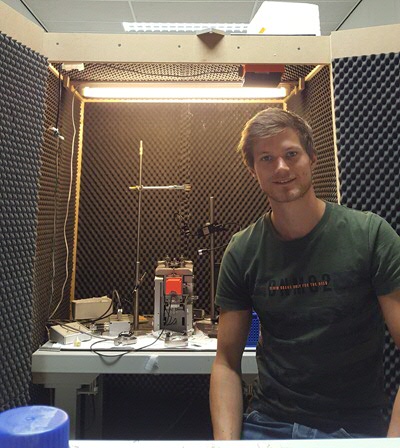Empty labs and corridors
The experimental research conducted at the Faculty of Science and Engineering was brought to an abrupt halt when a pandemic entered our country without politely knocking on the door. However, no crisis is strong enough to stop scientists from doing science. How are they managing this? The third and final scientist we asked about this is PhD student Chris van Ewijk.
Chris van Ewijk started working as a PhD student in Wouter Roos’s Molecular Biophysics group in January this year. While studying Physics, he discovered microscopy during one of his course units. The technological aspects of microscopy fascinated him, as did the biological samples that became visible by using microscopes. Van Ewijk followed his heart and ended up working on virus assembly. How exactly do different viral components come together to form a working virus? To examine this, he uses different types of microscopes.

Motivation
The last couple of months have been all but mundane for Van Ewijk. Being relatively new at his job, he had just finished gathering all the relevant background information and completed all the preparations to start working in the lab when, suddenly, he was not allowed to come to work anymore. This was a bit of a shock. However, he admits: ‘Working from home was okay for me. I expected to lose touch, but that did not happen. I finally got to do things that I usually did not have time for. The motivation I felt at first slowly waned a bit. As long as I had a goal in mind though, working from home was fine for me.’
Van Ewijk spent his time at home well. ‘I have done many things that are useful to me and to the rest of the group. I mainly did a lot of programming. My background in physics really helped with this. As a group, we gather a lot of scientific data from the microscopes that we use. I wrote some programs that will help us with the analysis of these data in the future.’
Like many others, Van Ewijk made the best of the situation. When life gives you lemons, you make lemonade, right? What happened after this, however, did not happen to many scientists. Some members of Wouter Roos’s research group were allowed to go back to the lab quite some time before other scientists were given permission to do so. ‘We started a new project for which we were granted permission to go back to the lab early. My colleague and I have been working in the lab fulltime since the middle of April.’
Safety
The permission to return to the lab came with many rules and regulations, including the well-known 1.5-metre distance rule. This was a bit of a puzzle, Van Ewijk explains. ‘The labs we work in are not those big ones that you might be familiar with. Our labs are small rooms with huge microscopes in them. Therefore, we try not to be in the same room at the same time. We do, however, check on each other regularly. We work at the same time mainly for safety reasons, so that there is always someone present, in case anything goes wrong.’ To ensure a safe working environment, there were disinfectants and face masks present from the beginning.
Being in an empty university building was an interesting experience, according to Van Ewijk. ‘It is very strange to walk through empty corridors that are usually filled with students and staff members. You will probably not encounter anyone, and if you do it is very special.’ The peace and serenity of the empty building can be viewed as a wealth, but there was one major drawback to the whole situation: all coffee machines were shut down. Luckily, Van Ewijk and his colleague managed to get a small coffee maker, which they set up in the office. This meant that they were able to energetically continue their research.
Relaxed
The situation has changed a lot since. Starting from the middle of May, Van Ewijk has been sharing the labs with his other colleagues once more. The restrictions, which were very strict at the beginning, are gradually being relaxed, the coffee machines are working again and the scientists are even partially welcome in their offices again. Van Ewijk is level-headed: ‘You get used to every situation. Working from home became normal, so did the empty corridors. Whatever lies in wait for us, we will find our way.’
Text: Kaila Ronde
See also:
Nne-to-five jobs are underappreciated'
Not enough cycling, colleagues and coffee breaks
| Last modified: | 11 August 2020 12.35 p.m. |
More news
-
10 June 2024
Swarming around a skyscraper
Every two weeks, UG Makers puts the spotlight on a researcher who has created something tangible, ranging from homemade measuring equipment for academic research to small or larger products that can change our daily lives. That is how UG...
-
21 May 2024
Results of 2024 University elections
The votes have been counted and the results of the University elections are in!

